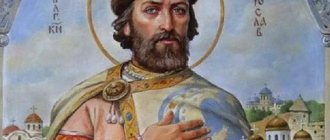THOMAS
She could repeat the fate of Anna Karenina. She was already ready to put the most terrible, blackest point in the tragedy of her life. But it happened differently. The “unfulfilled” Karenina became almost the only support for her world-famous brother in the last, dramatic days of his life.
In the works of Leo Tolstoy, the characters and life conflicts of his many relatives and friends are very recognizable: parents, tutor, sisters-in-law, aunts, brothers. And behind such bright literary stars as Anna Karenina there is a trail of famous prototypes. Among them, for example, is the eldest daughter of A.S. Pushkin, Maria. In any case, Tolstoy wrote the appearance of his heroine precisely from her, as evidenced by the sister of the writer’s wife T.A. Kuzminskaya: “...When Lev Nikolayevich was introduced to Maria Alexandrovna, he sat down at the tea table next to her; conversation, I don’t know them, but I know that she served him as the type of Anna Karenina, not in character, not in life, but in appearance, he himself admitted this.” And in the turbulent course of his heroine’s fate, he mixed the experiences of several ladies he knew. The personal drama of one of the women closest to Tolstoy - his sister Maria Nikolaevna - has many similarities with Karenin's. But the writer threw his Anna under the wheels of a train, plunging her into the worst of sins - as you know, you can’t even pray for suicides. But in real life, the Lord wrote a completely different scenario for Maria Nikolaevna.
Roman Tolstoy
One day, Maria Nikolaevna asked her brother to send her a new novel, which “would be terribly pleasant to read.” We were talking about the already sensational "Anna Karenina", the first and second parts of which were published in the magazine "Russian Messenger". At this time, Maria was just experiencing the consequences of her stormy love affair. But, not yet knowing how Lev Nikolayevich’s essay would end, she wrote to him: “The thought of suicide began to haunt me... so persistently that it became like illness or insanity... God, if only all Anna Karenina knew what awaited them, as if they fled from momentary pleasures, which are never pleasures, because everything that is illegal can never be happiness.”
Only thanks to her character and the efforts of her brother, Mary did not fall into the abyss. And in order to find out the true reasons for such deep despair, let's trace the life of Maria Nikolaevna Tolstoy to this Rubicon.
Maria Tolstaya. Photo from the early 1850s.
Maria, orphaned in infancy (her mother died when she was barely six months old, and her father when she was seven years old. - O.L.), together with her older brothers - Nikolai, Sergei, Dmitry and Lev - was raised by her aunts in Orthodox traditions. With Levushka, who was only a year and a half older than her, they were especially attached to each other, and they had similar characters. From the age of 16, Leo flatly refused to go to liturgy, fast, confess and receive communion. During his student years, instead of a pectoral cross, he wore on his chest a medallion with the image of Jean-Jacques Rousseau, whom he considered his idol. Unlike her rebel brother, Mary did not shy away from the prayers and sacraments of Orthodoxy. But spoiled by the attention and indulgence of her guardians, pampered and capricious, she categorically did not submit to the “from bell to bell” way of life.
Determined to study at the Rodionovsky Institute of Noble Maidens in Kazan, she could not bring herself to attend classes regularly. And they even made an exception for her, appointing her as “coming”.
However, the lack of college education was compensated for at home: Maria Nikolaevna spoke excellent French, played the violin and piano, drew, and was a witty conversationalist.
The guardian aunts hastened to get rid of her niece, marrying her to a distant relative, Valerian Petrovich Tolstoy, who was older than her by a whole life - 17 years. In the first year of marriage, Maria confessed to Lev Nikolaevich in a letter: “I married the one I loved.” Having buried her firstborn and given birth to three more children - Varvara (1845), Nikolai (1847) and Elizaveta (1852), Maria Nikolaevna suddenly succumbed to her heart's passion. When Ivan Sergeevich Turgenev arrived at his estate Spasskoye-Lutovinovo and the Tolstoys paid him a neighborly visit of courtesy, mutual sympathy instantly arose between 24-year-old Maria and 36-year-old Turgenev. It seems that Maria made a strong impression on the writer, since he also told P.V. Annenkov about his acquaintance with her: “...one of the most attractive creatures I have ever met. Sweet, smart, simple - I couldn’t take my eyes off her. <…> I almost fell in love,” and to E. Ya. Kolbasin: “A sweet, pretty woman,” and to N. A. Nekrasov: “The wife of Count Tolstoy, my neighbor - the sister of the author of “Adolescence” - a sweet woman, smart , kind and very attractive. Tomorrow I and Countess Tolstoy will be baptized by Turgenev’s priest, I will have sex with her.” Not experienced in the subtleties of social life, Maria mistook the writer’s emotions for a genuine passion for her. Brother Nikolai anxiously reported to Lev: “Mashenka is delighted with Turgenev. But Masha does not know the world and may well be mistaken about such an intelligent person as Turgenev.” The fruit of that love was Turgenev's story "Faust", the main character of which, Vera Eltsova, is a copy of Tolstoy. In one of his letters, Ivan Sergeevich confesses to her: “Faust was written at a turning point, at a turning point in life - the whole soul flared up with the last fire of memories, hopes, youth.” And he doesn't promise anything.
Passions
In 1850, Sergei Tolstoy and his girlfriend arrived at the Pirogovo estate in the Tula province, which he inherited from his mother. the lovers spent all their time together. In 1852, Seryozha had a reason to visit his younger brother Lev - he published the story “Childhood”, in which his relatives became the prototypes for all the characters. The retired officer went alone to visit the aspiring writer; it was indecent to take with him a mistress of low birth.
Sergei Tolstoy (far left) with his brothers
In his estate, the aristocrat actively introduced the ideals of democracy. He had little interest in farming, which had a bad effect on the local stud farm and the vast fields that were on his property. The only noble pastime that the former guardsman respected was hunting. Tolstoy did not receive any of the aristocrats, so that they would not accidentally offend his beloved.
“She didn’t know how to feel anything halfway…”
Ivan Turgenev. Photo by F. Nadar. 1878
The clouds on the family horizon thickened when one day, not at all wonderful, Maria Nikolaevna learned about her husband’s numerous infidelities. His love affairs were no secret to many family members. Thus, according to the testimony of Tatyana Kuzminskaya, Lev Nikolaevich’s sister-in-law, “Valeryan Petrovich led a very immoral life and cheated on his wife whenever the opportunity presented itself.” However, the wife, as usually happens, was the last to know about everything. It turned out that Count Tolstoy did not disdain intimacy even with his children’s governess. These are whose features appear in the image of Stiva Oblonsky! It was not in the character of Maria Nikolaevna to put up with humiliation and meekly endure insults. “She didn’t know how to feel anything halfway and everything... she gave herself over without restraint, with all her soul, she wasn’t used to holding back from a young age,” recalled daughter Elizaveta Valerianovna Obolenskaya.
Having collected the children, Maria Nikolaevna left her husband’s house forever, defiantly slamming the door loudly. And she hastened to inform Turgenev about the change in her personal life. He replied from Courtavnel (the estate of Pauline and Louis Viardot, 50 km from Paris. - O.L.): “... I will remain your friend as long as I live.” Then he wrote to Leo Tolstoy: “...Tell her that I often think about her and that if wishes could come true, she would be completely happy.” But Maria Nikolaevna hoped for more. In any case, Elena Denisenko, her youngest daughter, said: “You know, Lenochka,” my mother turned to me one day, pointing to a photograph of Turgenev, “if he had not been a monogamist in life and had not loved Polina Viardot so passionately, we could be happy with him..."
Realizing that his sister, to a certain extent, found herself “at the bottom,” Lev Nikolaevich, who was in Baden-Baden, wrote in his diary: “Masha separated from Valerian. This news suffocated me." He immediately returned to Russia, rented a house in Moscow for the winter for his sister and her children, and moved in with them. And in the spring he took them to Europe: Gier, Paris, Marseille, Frankfurt. But the mental wounds were weakly scarred by changing places and contemplating foreign beauties. The cure for Maria Nikolaevna was love, which jumped out like a jack-in-the-box as soon as her brother left for Russia, leaving her and the children to heal in the waters. The hero of this novel was the Swedish naval officer Viscount Hector de Clen. Together with him, Maria Nikolaevna went to Algeria, where she spent three happy winters. And in September 1863 in Geneva she gave birth to a daughter, Elena. The Viscount, having not received his parents' blessing, refused to marry. So the prospects for Maria Nikolaevna’s life were painted in completely gloomy colors. For secular society, “whose opinion she seemed to value so little,” but still could not ignore, Tolstaya instantly became an outcast.
Childhood
Seryozha became the second child born to Maria Volkonskaya in Tolstoy’s marriage. He was born in February 1826. After him, 2 more brothers and a sister appeared in the family. When the boy was 4 years old, his mother died. The father was depressed by the loss of his wife; he was not interested in raising children. All the worries about the kids fell on the shoulders of his relative Tatyana Ergolskaya.
Yasnaya Polyana estate, where Sergei Tolstoy spent his childhood
From an early age, the heir to the count's family demonstrated amazing intelligence. Mathematics and humanities subjects were easy for him. The child drew and played music beautifully. In appearance, Sergei resembled his father Nikolai - he was handsome and stately. He could have achieved heights in creativity or made a career in science, but adults corrupted his character by indulging his whims.
“No hand will ever rise to reproach you”
She did not have the means to return to Russia, she was entangled in debt, and, moreover, tormented by doubts about what to do with the newborn - to abandon her or recognize her as her daughter, she finally drove herself into a dead end. And in desperation she wrote to her brother the same thing: “If all Anna Karenina knew what awaited them...” Figuratively - one of her legs was already raised over the abyss. And Lev Nikolaevich felt this and, in order to prevent the irreparable from happening, rushed to save his sister. First of all, he supported her with a letter: “Dear, dear, a thousand times dear, my friend Mashenka. Besides love for you, all that love that was somewhere far away before, and pity, and love, there is nothing and there will be nothing in my heart. No honest person will ever raise his hand to reproach you.” Secondly, he ordered his brother Sergei to urgently go to Geneva, and he himself began to work for the official divorce of his sister from her husband. Then in Russia only the Synod could give permission for divorce, and only in three cases: the unknown absence of a spouse for more than five years; physical disabilities that prevent marriage; and adultery. In all cases, the guilty party had no right to remarry. Valerian Petrovich took the blame for the divorce, dooming himself to further celibacy. Looking ahead, we note that these efforts were in vain, since, having lost hope of marriage with the Viscount, Maria Nikolaevna did not complete the divorce case when Lev Nikolaevich handed over all the necessary papers to her. She remained legally the wife of Valerian Tolstoy, and then his widow.
In Geneva, Sergei Nikolaevich became the godfather of his illegitimate niece, giving her his patronymic; found a foster family for her with a wet nurse; helped arrange Nikolai’s nephew in a boarding school, and took his sister and two older daughters to their homeland. But the absolute collapse of hopes for personal happiness and forced separation from two children turned the next sixteen years of Maria Nikolaevna’s life into a living hell. “She lived in Pokrovsky, then in Yasnaya Polyana, then in Moscow, then abroad. The emptiness of a lonely life depressed her. She became even more capricious and irritable,” recalled her nephew Sergei Lvovich Tolstoy. And his daughter, Elizaveta Obolenskaya, echoes him: “Her life over these years, as I recall, gives the impression of some kind of restless, aimless, joyless wandering.” But in these wanderings, Maria Nikolaevna suddenly realized the reasons for her temptations and wrote to Lev Nikolaevich:
“The answer to all difficult situations in life is the Gospel: if I had read it more often, when I was undeservedly unhappy with my husband, I would have understood that it was the cross that He sent me: “He who endures to the end will be saved,” but I wanted to free oneself, to leave His will - so I received another cross, even purer.”
And in 1879, when everything worked out for the older children: the son, having returned to Moscow, entered the service, and the daughters got married, Maria Nikolaevna decided to bring sixteen-year-old Elena from abroad. But at first she was embarrassed by this “cross”, and in public did not recognize her as a daughter, but passed her off as her pupil. Brothers Sergei and Lev did not understand this and openly called the girl their niece. “It’s strange,” recalled Elizaveta Obolenskaya, “that the mother, so straightforward, so independent, <...> in this case was embarrassed and did not have the courage to publicly call her her daughter.”
It would seem that life, albeit with a creak, is still getting better, the soul calms down. And Tolstoy’s novel, unlike Tolstoy’s novel, did without victims. But there was one more test ahead, which would forever determine the existence of Countess Maria Nikolaevna.
Death
82-year-old Leo Tolstoy, accompanied by his personal doctor D.P. Makovitsky, left Yasnaya Polyana. On the way, the writer fell ill and got off the train at the Astapovo railway station. Lev Nikolaevich spent the last 7 days of his life in the stationmaster's house. The whole country followed the news about Tolstoy’s health.
The children and wife arrived at the Astapovo station, but Leo Tolstoy did not want to see anyone. The classic died on November 7, 1910: he died of pneumonia. His wife survived him by 9 years. Tolstoy was buried in Yasnaya Polyana.
"She never returned to the world"
She was always a believer, but she never talked about dedicating her life entirely to God. The sudden death of her only son Nikolai changed her whole life: he burned down from typhus just a few months after his own wedding. Experiencing this blow with trust in God, Maria Nikolaevna realized that she could no longer live as before. All interest in worldly life gradually faded away in her. She began to immerse herself more and more in religious thoughts, and she found a confessor - the archpriest of the Kremlin Archangel Cathedral in Moscow, Father Valentin Amfitheatrov. “He made a strong impression on his mother,” recalled Elizaveta Obolenskaya. - She became interested in him; I didn’t miss a single one of his services, not a single opportunity to talk with him. For two years he was her mentor and confessor, but this was not enough for her; She was overcome by the desire to radically change her life. She wanted to break with the city, with everything that was the same, and start a completely new life.”
Monasticism is not an alien topic to the history of the Tolstoy family. Two of Maria Nikolaevna’s aunts - P. I. Yushkova and A. I. Osten-Saken - lived at the monastery and both rested in the monastery cemetery of Optina Pustyn. By the way, at the latter’s funeral, when little Maria was brought under Elder Leonid’s blessing, he uttered a prophecy that was incomprehensible to her at the time: “Masha, you will be ours.”
Shamordino. Photo of the late 20th century
The idea of monasticism became stronger in the minds of Maria Nikolaevna during her visit to Optina Hermitage and conversations with Elder Ambrose. “She without hesitation submitted her will to him, and from that day he became her spiritual leader, she never returned to the world,” recalled daughter Elizabeth. The Shamordino monastery was under the tutelage of Father Ambrose, who founded it, and not a single building was erected without his instructions, not a single nun was accepted into the monastery without his consent. Father Ambrose chose a place to build Maria Nikolaevna’s cell and drew its plan himself. But Maria Nikolaevna was tonsured a nun after his death. Thus Countess Tolstaya left the world forever.
Having donned monastic robes, Mother Mary “was not reborn, but changed greatly.” As Elizaveta Obolenskaya recalled: “She worked hard on herself, but could not completely get rid of her main sin - irritability. The abbess, under whom my mother was admitted, was an intelligent, warm-hearted woman... Once someone complained to her about my mother’s bad character; she said: “Yes, her character is not good, but her soul is childlike, pure, and this is more valuable than a good character.”
Maria Nikolaevna’s obstinate and somewhat rebellious disposition was manifested in her attitude towards performing prayer. In church she never lit candles, as other nuns did, did not venerate images, did not serve prayers, but prayed simply and quietly in her place, where she had a chair and a rug laid out. At first, the Shamorda sisters looked at her sideways, but then they got used to it.
Maria Nikolaevna’s obedience was to read the incessant Psalter. The Psalter was read, as a rule, by senior novices and nuns from the nobility. Since 1897, Mother Maria was in charge of the reading of the Psalter. “The most difficult thing for my mother was monastic obedience, which is mandatory for monks and is considered the most important,” recalled Elizaveta Obolenskaya. “She, who all her life did not submit to anyone, did not recognize anyone’s will above her, had to ask the permission of the abbess or confessor for everything. It was very difficult for her, and she had to work a lot on herself, humble herself.”
Psychological picture
Nikolai Tolstoy, according to his youngest son, was a worthy man and “never humiliated himself before anyone.” His character was characterized by special courtesy towards others. He had an excellent sense of humor and loved to amuse those around him with comic stories.
From the surviving portraits one can judge what Nikolai Ilyich Tolstoy looked like - photos in those distant times were very rare. In Lev Nikolayevich's childhood memories, his father was depicted as a well-built man, always in a good mood, but with sad eyes.
“One of the seven hundred Shamorda fools”
Nun Maria now visited her native Yasnaya Polyana only with a blessing. One day, Lev Nikolayevich tried to persuade her to stay late on a visit, but she said: “I can’t do this without the blessing of Elder Joseph. Without his blessing, our nuns do nothing at all.” “How many nuns are there in Shamordin?” - asked Tolstoy. "Seven hundred". - “And not one of you, seven hundred fools, can live by your own mind! Everything requires the blessing of an elder!” Mother Mary retorted with a meek smile: “We are praying for you, we are not all fools.”
And at the next meeting, she gave her brother an embroidered pillow with a note: “One of seven hundred Sh-x fools.” Lev Nikolaevich was embarrassed by this and very much regretted what he said. On that pillow, on a red and black background, Nun Maria marked the main Orthodox symbols with a white cross. Embroidering the Star of Bethlehem, which announced the birth of the Savior, she mentally reminded her brother that salvation lies only in Him; the cross is a symbol of sorrow, illness and other hardships of earthly life sent by God; palm tree - symbol of martyrdom; keys - from the Kingdom of Heaven; anchor - hope for salvation; crown - a royal crown, prepared for the one whose heart belongs entirely to God, who keeps his mouth from verbosity (lock), who praises God (lyre) and lives without worrying about tomorrow (butterfly); chalice - a church cup in which the Holy Gifts are carried out during the Divine Liturgy; The rooster is a reminder to Christians of the renunciation of the Apostle Peter and the mercy of God, which forgives the sins of repentant sinners. This pillow is still kept in the writer’s room in his Yasnaya Polyana museum-estate.
Another time, when Mother Maria came to visit her brother, she was placed in a room “with vaults.” Going to bed, she began to look for an image to pray, and, seeing something dark in the corner, she decided that it was an icon. And in the morning I saw that it was just a handful of flies stuck to the “trap”. Maria Nikolaevna told about this at breakfast and noted displeasedly that there was nothing in the house to even cross herself to. Lev Nikolaevich, seeing that she was in a bad mood, remained silent. And already at dinner, when my sister asked for sugar with the turnip soufflé, he remarked: “How do you eat turnips with sugar? God will punish you for this, and flies will not save you.” Everyone laughed heartily, and Maria Nikolaevna first of all. “She more and more gave the gratifying impression of a person who had calmed down, who had found what he was looking for. Even though her faith was childish, even if it was unreasonable, it helped her become better and happier,” recalled her daughter Elizabeth.
Sergey Lvovich
Tolstoy described his eldest son Sergei this way: “The eldest, blond, is not stupid. There is something weak and patient in the expression and very meek... Everyone says that he looks like my older brother. I'm afraid to believe. That would be too good. The brother’s main feature was not selfishness or self-sacrifice, but a strict middle ground... Seryozha is smart - a mathematical mind and a sensitivity to art, an excellent student, a dexterous jumper, gymnastics; but gauche (clumsy, French) and absent-minded.”
Sergey Lvovich. (wikipedia.org)
Sergei Lvovich was the only one of all the writer’s children who survived the October Revolution in his homeland. He was seriously involved in music, was a professor at the Moscow Conservatory and one of the founders of the Leo Tolstoy Museum in Moscow, and took part in commenting on his father’s Complete Works. Also known as the author of musical works: “Twenty-seven Scottish Songs”, “Belgian Songs”, “Hindu Songs and Dances”; wrote romances based on poems by Pushkin, Fet, Tyutchev. He died in 1947 at the age of 84.
Ilya Lvovich
Characteristics of Leo Tolstoy: “Ilya, the third... Broad-boned, white, ruddy, shining. He studies poorly. Always thinking about what he is not told to think about. He invents games himself. He is neat, thrifty, and “what’s mine” is very important to him. Hot and violent (impulsive), now fight; but also gentle and very sensitive. Sensual - he loves to eat and lie quietly... Everything that is not permitted has a charm for him... Ilya will die if he does not have a strict and beloved leader.”
Ilya Lvovich. (wikipedia.org)
Ilya did not graduate from high school, he worked alternately as an official, then as a bank employee, then as an agent of the Russian social insurance company, then as an agent for the liquidation of private estates. During the First World War he worked for the Red Cross.
In 1916, Ilya Lvovich left for the USA, where until the end of his life he earned money by lecturing on Tolstoy’s work and worldview.
Lev Lvovich was one of the most talented in the family. Tolstoy himself described his son as follows: “Handsome: dexterous, intelligent, graceful. Every dress fits as if it were made for it. Everything that others do, he does, and everything is very clever and good. I still don’t understand it well.”
Lev Lvovich. (wikipedia.org)
In his youth, he was carried away by his father’s ideas, but over time he switched to anti-Tolstoy, patriotic and monarchist positions. In 1918, without waiting for arrest, he emigrated. He lived in France and Italy, and finally settled in Sweden in 1940. In exile he continued to engage in creativity. Lev Lvovich's works have been translated into French, German, Swedish, Hungarian and Italian.
Tatyana Lvovna
Tatyana, like her sisters Maria and Alexandra, was a follower of Tolstoy's teachings. From her mother, the writer's eldest daughter inherited practicality, the ability to do a variety of things, like her mother, she loved toilets, entertainment and was not without vanity. She inherited the ability to write from her father and became a writer.
Tatyana Lvovna. (wikipedia.org)
In 1925, together with her daughter, Tatyana Lvovna went abroad, lived in Paris, where her guests were Bunin, Maurois, Chaliapin, Stravinsky, Alexandre Benois and many other representatives of culture and art. From Paris she moved to Italy, where she spent the rest of her life.











